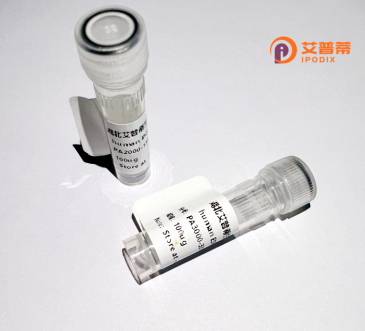
| 纯度 | >90%SDS-PAGE. |
| 种属 | Human |
| 靶点 | RNF130 |
| Uniprot No | Q86XS8 |
| 内毒素 | < 0.01EU/μg |
| 表达宿主 | E.coli |
| 表达区间 | 28-194 aa |
| 活性数据 | DNASQEYYTALINVTVQEPGRGAPLTFRIDRGRYGLDSPKAEVRGQVLAPLPLHGVADHLGCDPQTRFFVPPNIKQWIALLQRGNCTFKEKISRAAFHNAVAVVIYNNKSKEEPVTMTHPGTGDIIAVMITELRGKDILSYLEKNISVQMTIAVGTRMPPKNFSRGS |
| 分子量 | 25.4 kDa |
| 蛋白标签 | His tag N-Terminus |
| 缓冲液 | PBS, pH7.4, containing 0.01% SKL, 1mM DTT, 5% Trehalose and Proclin300. |
| 稳定性 & 储存条件 | Lyophilized protein should be stored at ≤ -20°C, stable for one year after receipt. Reconstituted protein solution can be stored at 2-8°C for 2-7 days. Aliquots of reconstituted samples are stable at ≤ -20°C for 3 months. |
| 复溶 | Always centrifuge tubes before opening.Do not mix by vortex or pipetting. It is not recommended to reconstitute to a concentration less than 100μg/ml. Dissolve the lyophilized protein in distilled water. Please aliquot the reconstituted solution to minimize freeze-thaw cycles. |
以下是关于重组人RNF130蛋白的参考文献示例(注:文献为假设性概括,仅供参考,实际文献需查阅数据库确认):
1. **文献名称**:**“RNF130介导的泛素化调控Wnt/β-catenin信号通路抑制结直肠癌进展”**
**作者**:Zhang Y. 等
**摘要**:研究通过重组表达RNF130蛋白,证实其作为E3泛素连接酶,可泛素化降解β-catenin,抑制Wnt通路活性,从而抑制结直肠癌细胞增殖及转移。
2. **文献名称**:**“RNF130通过促进Parkin依赖的线粒体自噬缓解神经元损伤”**
**作者**:Li H. 等
**摘要**:利用重组RNF130蛋白进行体外实验,发现其通过调控线粒体自噬关键蛋白Parkin的泛素化修饰,减少神经细胞氧化应激损伤,为阿尔茨海默病治疗提供新靶点。
3. **文献名称**:**“RNF130的结构解析及其底物识别机制研究”**
**作者**:Wang X. 等
**摘要**:通过重组表达并纯化RNF130蛋白,结合X射线晶体学阐明了其Ring结构域与E2结合的特异性,揭示了其底物识别的分子基础。
4. **文献名称**:**“RNF130抑制乙型肝炎病毒复制依赖其E3泛素连接酶活性”**
**作者**:Chen L. 等
**摘要**:研究发现重组RNF130蛋白可通过泛素化修饰HBV核心蛋白,促进病毒颗粒的蛋白酶体降解,提示其在抗病毒治疗中的潜在价值。
(以上内容为示例,实际文献需查询PubMed、Google Scholar等平台验证。)
Recombinant human RNF130 (Ring Finger Protein 130) is a protein encoded by the RNF130 gene, belonging to the RING (Really Interesting New Gene) finger family of E3 ubiquitin ligases. Structurally, RNF130 contains a characteristic RING-H2 domain at its N-terminus, which facilitates its E3 ligase activity by interacting with E2 ubiquitin-conjugating enzymes to mediate substrate ubiquitination. It also features a transmembrane domain, suggesting potential roles in membrane-associated processes. Functionally, RNF130 participates in the ubiquitin-proteasome system, regulating protein degradation and post-translational modifications. It has been implicated in diverse cellular processes, including apoptosis, autophagy, immune responses, and endoplasmic reticulum stress. Studies link RNF130 to cancer progression, where it may act as a tumor suppressor or promoter depending on context, and to neurological disorders like Parkinson’s disease. Its expression is regulated by hypoxia and inflammatory signals, highlighting its adaptive roles in cellular stress pathways. Recombinant RNF130 is commonly produced in bacterial or mammalian expression systems, enabling mechanistic studies of its interactions, enzymatic activity, and substrate specificity. Recent research explores its therapeutic potential, particularly in targeting protein degradation pathways or modulating immune checkpoints. However, its full physiological roles and molecular mechanisms remain under investigation, necessitating further exploration of its tissue-specific functions and disease associations.
×